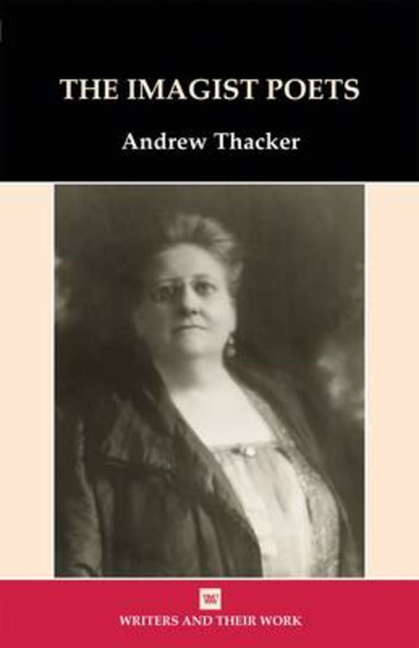Book contents
- Frontmatter
- Dedication
- Contents
- Acknowledgements
- Biographical Outlines
- Abbreviations
- Introduction: The Formation of Imagism
- 1 Movements and Modernism
- 2 Publishing, Publicity, and Magazines
- 3 Prefaces and Manifestos
- 4 Modern Themes
- 5 Urban Images
- 6 Gender and Sexuality: ‘Amygism’ and ‘H.D. Imagiste’
- Afterword
- Notes
- Select Bibliography
- Index
2 - Publishing, Publicity, and Magazines
- Frontmatter
- Dedication
- Contents
- Acknowledgements
- Biographical Outlines
- Abbreviations
- Introduction: The Formation of Imagism
- 1 Movements and Modernism
- 2 Publishing, Publicity, and Magazines
- 3 Prefaces and Manifestos
- 4 Modern Themes
- 5 Urban Images
- 6 Gender and Sexuality: ‘Amygism’ and ‘H.D. Imagiste’
- Afterword
- Notes
- Select Bibliography
- Index
Summary
The acclaimed critic and biographer Richard Ellmann once suggested that ‘Literary movements pass their infancy in inarticulate disaffection, but mature when they achieve a vocabulary’. One might add that another marker of successful adulthood for twentieth-century literary movements was the dissemination of this vocabulary in the pages of one or more magazines. The previous chapter examined the pressures that impelled the Imagist movement into being, considering the necessity for modernist poets to group together in order to publicly voice their disaffection. This chapter considers further how Pound and Lowell utilized strategies of advertisement and publicity for Imagism, distributing Imagist ideas as widely as possible across the field of literary publication. Particularly significant was the use of the many modernist little magazines in the period, a fact demonstrated by the publication of Pound's Des Imagistes collection in a magazine (The Glebe) prior to book publication. Returning Imagist poetry to the periodical presses where it was often first published, first reviewed, and first criticized, presents a more complex picture of how the verse emerged than when we read the poems in later anthologies, like those of Peter Jones, William Pratt or Bob Blaisdell, or in the collected poems of the individual authors. We also read and interpret an Imagist poem quite differently when we encounter it in the pages of a magazine like The Egoist, where it jostles for space alongside a serialized novel by Joyce, an editorial on women's rights, or a philosophical consideration of contemporary anarchism. As Peter McDonald argues, asking ‘where and how texts were first published… is a way into a much larger series of questions which challenge our understanding of how texts relate to their many, shifting contexts’.
Almost all of the key Imagists wrote, funded or were involved editorially with modernist magazines. In Britain H.D. and Richard Aldington were assistant editors on The Egoist; Flint wrote and reviewed widely for The New Age, Poetry and Drama, and The Poetry Review, while Pound wrote for just about every key magazine in the period but with a prominent voice in the American magazines, Poetry and The Little Review. At various times Fletcher and Lowell were financial supporters for magazines, and Pound in particular understood the importance of having a periodical in which new modernist ideas could be advertised.
- Type
- Chapter
- Information
- The Imagist Poets , pp. 24 - 36Publisher: Liverpool University PressPrint publication year: 2011



